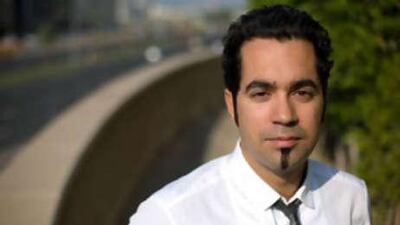DUBAI // Mahmoud Kaabour's grandmother, Fatima, lives in an old neighbourhood in Beirut, a lifestyle on the verge of extinction. "She buys her groceries by throwing a hay basket from the window to the vendor," says the film director. "She waves at the nearby welding shop to close down whenever she wants to take a nap." The old family house, where the octogenarian raised her six children and grandchildren, where they celebrated Eid and hid during air raids on Lebanon's capital, is empty now except for her.
Kaabour, whose company, Veritas Films, is a twofour54 partner based in Abu Dhabi, wants to preserve that dying urban history and craft a tribute to his grandmother, and others everywhere. That, as well as preserving the oral history of his deceased grandfather, the violinist whose name the director carries, was the impetus for shooting Teta Alf Marra (Grandma, a Thousand Times). Kaabour, who has lived in the emirates since 2005, is confident that the documentary will appeal to Emiratis who value family traditions, and expatriates who endure a separation that can stretch over years as they toil far away from home.
It also offers a contrasting view of multiple generations. In one scene, Kaabour dons his grandfather's old clothes and fez. In another, he plays his grandfather's decades-old violin improvisations for his grandmother on an iPod. "I think it bridges the past of the Middle East and the present through a very human story, not to mention that affection to grandmothers is quite universal," says Kaabour. "So, regardless of where you're from, I think people will be moved and stimulated to rethink their relation with their grandmothers."
Kaabour, who directed the award-winning documentary Being Osama, about the lives of individuals named Osama living in Canada after the September 11, 2001, terrorist attacks, hopes to finish principal photography for the film this month. Then he plans to hit the festival circuit, pitching the film for the International Documentary Film Festival in Amsterdam and the Dubai Film Festival, with screenings scheduled for September.
Kaabour says his grandmother was eager to be on camera. She had appeared on reportages on the life of his uncle Ahmad Kaabour, a composer who wrote revolutionary songs on Palestine and Lebanon. But Teta is also eager to see her grandson's work. "She told me I hope you are not planning on waiting on it until after I die," he says. Kaabour paid for the film mostly from his own pocket, with a US$15,000 (Dh55,000) grant from Screen Institute Beirut, which will also provide post-production facilities. He never doubted the value or potential for the project, the style of which, he acknowledges, is very experimental.
"Maybe I'm missing that lifestyle," says Kaabour. "Grandmothers are people you see on Christmas, or when you fly back home, on that one day that you have to go see family. Many people among us grew up with their grandparents. It's a tribute." kshaheen@thenational.ae


